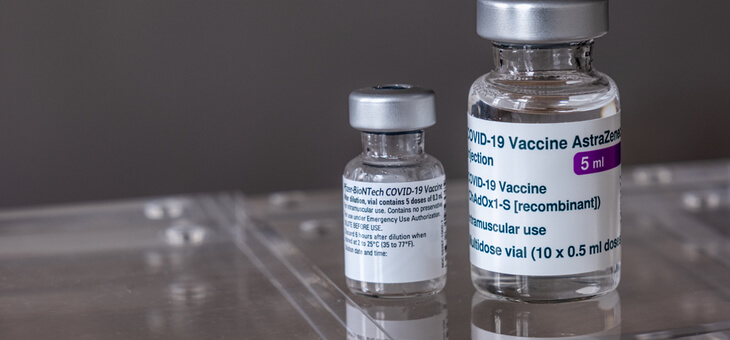Those holding out for the arrival of the Pfizer vaccine believing it to offer better protection against COVID than the AstraZeneca may be risking their health for no additional benefit, according to the latest research.
Australia’s vaccine rollout has been slowed in part by the reluctance of people to embrace the AstraZeneca vaccine, based on conflicting information from government bodies and medical experts.
But new research shows that when fighting the highly infectious Delta variant, two shots of the AstraZeneca vaccine provide just as much protection as two shots of Pfizer in the long run, despite initial higher rates of protection provided by Pfizer.
“Two doses of Pfizer-BioNTech have greater initial effectiveness against new COVID-19 infections, but this declines faster compared with two doses of Oxford-AstraZeneca,” researchers say.
“Two doses of either vaccine still provided at least the same level of protection as having had COVID-19 before through natural infection”
Read: How other countries are bringing COVID vaccines to the people
The AstraZeneca vaccine has had a troubled history in Australia. Initially touted as the nation’s saviour, homegrown AstraZeneca production facilities quickly sprang up and manufacturing kicked into gear.
But everything changed for AstraZeneca on 8 April, when Prime Minister Scott Morrison announced in a late-night press conference that due to an extremely rare but very serious risk of blood clots, particularly in younger people, the Pfizer mRNA-based vaccine would be recommended for those under 50. Just days later, that advice was changed to people under 60.
The problem was that supplies of Pfizer were scarce in Australia and more wouldn’t be arriving any time soon. The situation was concerning, but most remained content to wait for the arrival of more Pfizer as case number remained relatively low.
Since then, the much more infectious and deadly Delta variant has arrived in the country, crippling the economy with another round of stressful and drawn-out lockdowns putting the majority of the country’s population under strict lockdown.
The Australian Technical Advisory Group on Immunisation (ATAGI) now recommends that for those living in an outbreak area, the benefits of having the AstraZeneca jab outweigh the comparatively small risk of complications.
Read: How to talk to someone who doesn’t want a COVID vaccine
“ATAGI reaffirms previous advice that in a large outbreak, the benefits of the COVID-19 vaccine AstraZeneca are greater than the risk of rare side-effects for all age groups,” ATAGI says.
The pressing need for mass vaccination is obvious but there is a lingering reluctance among those under 60, particularly those aged 18-39, to get the widely available AstraZeneca jab.
The take-up of AstraZeneca was hampered even further last Thursday, when the PM made a surprise captain’s call announcement that those in the 18-39 age group could begin making appointments to receive the Pfizer vaccine from 30 August.
The news was welcomed, but state premiers urged their constituents not to wait for the promised Pfizer doses to arrive and to make a booking for the AstraZeneca dose as soon as possible. Medical professionals echoed the calls not to dismiss AstraZeneca completely.
“For people aged 16 to 39 who are champing at the bit for a Pfizer vaccine, it’s important to be aware you probably won’t be able to get one the day bookings open. It may well be that you have to wait weeks for an appointment,” Deakin University chair in epidemiology Catherine Bennett wrote for The Conversation.
Read: Experts change advice on flu shots and COVID vaccines
“So, if you were already considering getting the AstraZeneca vaccine, or if you’ve already booked an appointment, stick with that.
“It’s a highly effective vaccine, the risk of any complication is incredibly small, and the benefits are significant.”
There may be a way to stretch the limited supply of the Pfizer vaccine a bit further, with studies showing that receiving a first dose of AstraZeneca and a second dose of Pfizer is not only safe and effective, but may even provide greater protections than two doses of the same type.
The ‘mix-and-match’ approach would allow more people to be vaccinated more quickly to meet the 70 and 80 per cent goals for lockdowns to be eased and lifted.
Have you been putting off getting a COVID jab while waiting for Pfizer to arrive? Would you now consider getting AstraZeneca or one of each? Have you chatted with a GP about what is best for you? Let us know in the comments section below.
If you enjoy our content, don’t keep it to yourself. Share our free eNews with your friends and encourage them to sign up.

